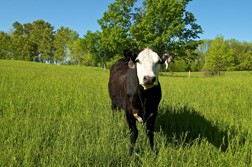Gibraltar Pushes for Farm-to-school Food
- Share
- Tweet
- Pin
- Share
Gibraltar Nutrition Specialist Carla Marr has always considered herself ahead of the curve when it comes to taking steps towards healthier school lunches. With Gibraltar School’s new farm-to-school initiative, she hopes to remain ahead.

Gibraltar Nutrition Specialist Carla Marr is “always looking to do the next, best thing that’s right for the kids.” By adding a fruit and vegetable bar, as well as working with Waseda Farms to purchase local beef, Marr hopes to help kids make healthier choices about what they are eating.
“We’re always looking to do the next, best thing that’s right for the kids,” she says. “I don’t ever want to get stagnant.”
It was with that state of mind that Marr attended a farm-to-school summit in Delavan late last year. The meeting provided information that schools could use to go local and showed off Wisconsin schools which had already established farm-to-school programs.
“I thought, if they can do it, we can do it,” says Marr.
In the wake of the summit, Marr began to consider a couple of ideas. One was a fruit and vegetable bar that would allow students to take healthy foods that they liked, rather than force upon them whatever fruit or vegetable was being served each day.
The fruit and vegetable bar was instituted this year, and so far it’s been a hit with the kids, according to Gibraltar School Board President Sally Pfeifer.

Abigail Nelson helps herself to some fresh strawberries at the Gibraltar School fruit and veggie bar.
“I was in school one day, and you wouldn’t believe it. Kids were grabbing tongs and fishing out red peppers. Sometimes they were taking more than they could eat,” she says.
The other idea that Marr began working on was switching to locally produced foods. Working with the UW – Extension in Sturgeon Bay, she began to identify and contact as many local food producers as she could. The plan was to start small, with foods like potatoes or apples, but things didn’t work out that way.
“I didn’t get one single potato farmer or orchard to return my survey,” says Marr. “So starting out small wasn’t an option. But I have a friend who owns a restaurant, and he said ‘Try Waseda Farms.’”
Tom Lutsey, who co-owns Waseda Farms with his wife Sharon, has been looking to partner with a local institution and provide them with ground beef for a while now.
“We can sell all the steaks we can produce, but that leaves us with a lot of hamburger left over,” he says. “So we figured if we could do a favor to a local institution, we should.”

A priority at Waseda Farms is raising healthy and stress-free cows.
Lutsey and his staff run a completely organic farm on Logerquist Road in Baileys Harbor, where the priority is raising healthy and stress-free cows. Everything at the farm – from the variety of grasses the cows eat to the relaxing examination system designed by Temple Grandin – is put in place with the thought that better, purer cows make better, purer meat.
According to Marr, the difference between Waseda Farms meat and the meat the school was using previously is clear.
“With the previous meat, the best way to describe it is that it was whitish-pink. And sometimes I’d be pulling chunks of lard out as thick as my thumb,” she says. “This meat was bright red from the moment I took it out of the case…and I didn’t have to pick out any chunks of lard.”
The additional cost to the school district is only about $60 per 80 pounds of ground beef, and that’s when compared to last year’s school meat prices. This year’s meat prices would have likely risen anyways, says Marr, because of the elimination and replacement of ammonia-treated beef trimmings known as “pink slime.”
The organic meat will be introduced slowly into school lunches, in items like chili and lasagna that will disguise the new, non-fatty taste from picky children’s tongues. Marr also plans to produce brochures to inform children and parents about the new meat and hopes that kids will be able to take field trips out to Waseda in the future.
Still not content to rest on her laurels, Marr is already considering ways to improve the plans she has in place. Next up on her agenda is turning the far-flung products in the fruit and veggie bar into local goods.
The move would reduce the school’s carbon footprint even further and keep some more dollars in Door County, which is important to Marr.
“It’s tough for everybody to make a living in Door County,” says Marr, “so if you can help your neighbor, better yet.”
